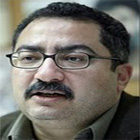Forget the Oscars, Follow the Freedom of Expression Awards
by Silvia Duarte / March 22, 2011 / No comments
Index on Censorship has published the shortlist for the Freedom of Expression Awards 2011. The 11th annual Awards honor those who, often at great personal risk, give voice to issues and stories from around the globe that may otherwise have passed unnoticed.
This year’s ceremony, to be held this coming Thursday March 24, will be hosted by broadcaster Jonathan Dimbleby at the Royal Institution in London, with a keynote speech by Booker Prize-winning novelist Howard Jacobson.
Award judges introduce the nominees in four categories: The Bindmans Award for Law and Campaigning, The Guardian Journalism Award, The Intelligent Life Arts Award and The New Media Award, supported by Google.
Today Sampsonia Way presents the nominees in the two first categories.
The Bindmans Award for Law and Campaigning
David Coombs
David Coombs is the criminal defense lawyer leading the defense of Specialist Bradley Manning, the 23-year-old US army intelligence analyst accused of leaking classified material to WikiLeaks. Manning faces a court martial and up to 52 years in prison.
Despite Coombs’s complaints, Manning has been held in solitary confinement in a military brig on a Prevention of Injury (POI) order since July 2010. This order, usually used for short periods prior to a psychological evaluation, limits his social contact, news consumption, ability to exercise and sleep. Coombs has used his blog to detail Manning’s experiences in solitary confinement.
Coombs called an assertion by a Pentagon Press Secretary that Manning is being treated like every other detainee at the Quantico brig “patently false”. His work has been pivotal in making Manning’s ordeal public.
Gao Zhisheng
Chinese lawyer Gao Zhisheng has been persecuted by the state for speaking out on human rights issues. Gao, a self-taught lawyer, forged a career representing the underdog in cases involving medical malpractice, land redistribution, employment disputes and forced sterilization.
He has also defended journalists and religious minorities including Christians and members of Falun Gong. In 2005, he resigned from the Communist Party and wrote an open letter to President Hu Jintao and Prime Minister Wen Jiabao, documenting the suffering of Falun Gong practitioners and calling on the leaders to end their “large-scale, organized” abuse.
Security forces took Gao from his home in Shaanxi province on 4 February 2009. Gao claimed the security forces tortured him. The state denied any knowledge of his whereabouts until January 2010, when a foreign ministry official said the lawyer was “where he should be”. Gao disappeared again in April 2010, and the Chinese state has refused to register him as a missing person.
Sherry Rehman
Sherry Rehman is a member of Pakistan’s parliament and chair of the Jinnah Institute, a think tank committed to “policies that promote fundamental rights, tolerance and pluralism”. For ten years Rehman served as editor-in-chief of the Herald, and from 1988 to 1998 she served as a member of the Council of Pakistan Newspaper Editors.
In November 2010, Rehman submitted a bill proposing amendments to Pakistan’s blasphemy law, which is routinely used to silence dissent and as a tool of intimidation against non-Muslims and members of minority Muslim sects.
Rehman and her late PPP colleague Salman Taseer were vocal critics of Pakistan’s blasphemy law. They were vociferous in their support of Aasia Bibi, a Christian woman sentenced to death after Muslim neighbors claimed she had blasphemed against Islam following an argument. After the assassination of Taseer by his bodyguard, Rehman was forced to withdraw her bill in February 2011.
The Guardian Journalism Award
Chiranuch Premchaiporn
Chiranuch Premchaiporn is the executive director and co-founder of the Thai online news site Prachatai (“Thai people”). She is also a founding member of Thai Netizen Network (TNN), a group of media activists, internet users, bloggers and IT academics who monitor violations of freedom of expression on the internet.
She is currently on trial, facing up to 50 years in jail, for comments posted on Prachatai that were critical of the monarchy. The comments were posted by a user; Chiranuch removed the comments after she was contacted by officials from the Ministry of Information. She is being prosecuted under both the Computer Crimes Act of 2007 and lèse majesté legislation, which makes criticism of the king a criminal offense. The case is seen as part of a crackdown on the media in Thailand, targeting satellite television news stations, community radio stations, print publications and websites aligned with anti-government advocates. The trial resumes in the autumn.
Ibrahim Eissa
Ibrahim Eissa is Egypt’s leading independent editor, described as a “one-man barometer of Egypt’s struggle for political and civic freedom”. Throughout his career, he has faced prosecution when his push for media freedom has fallen foul of the government. In 2010, he was fired from his position as editor of the independent newspaper al Dostour, after new owners bought the paper; his popular satellite talk show was also taken off air. His sacking came in the midst of a wider media crackdown in the run-up to the parliamentary elections, when Mubarak’s ruling National Democratic Party emerged victorious amid accusations of unprecedented vote rigging.
When Eissa was sacked from his job last year, the novelist Alaa al Aswany wrote: “Ibrahim Eissa did not oppose the government; he opposed the system … He called for real democratic change through free and fair elections and regular change at the top.
Read about the nominees for The Intelligent Life Arts award and The New Media award









